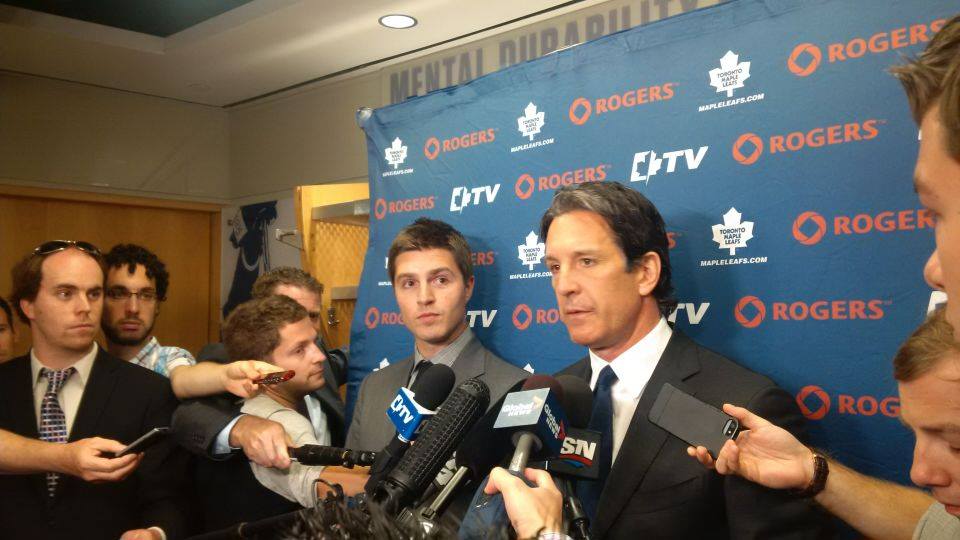The online hockey world reacted to news of the hiring of an assistant GM like it was its own version of the LeBron sweepstakes when the Leafs brought aboard young hockey executive Kyle Dubas yesterday. That’s of little shock given the Maple Leafs had become such a flashpoint in the debate on the role and place of advanced stats/analytics in hockey-ops decisions in the past year and a half — achieving modest success for 110 games despite ghastly underlying possession numbers and then having the floor fall out from under them when their overworked number one goalie got hurt late in the season.
As a young executive cutting his teeth in the NHL — alluding in his press conference to learning on the job as “an assistant who will do as I’m told’ – Dubas’ impact is unlikely to be hugely impactful in the short term but he represents a seachange in the Leafs’ previous stance on the utility of the burgeoning hockey stats movement. Long term, Dubas individual impact on the organization, and this apparent shift in organizational attitude and approach under Brendan Shanahan, stressing openness to new ideas when it comes to data-assisted interpretations of the game and its players, is going to be the next fascinating case study on hockey’s numbers game — especially given Dubas, a pioneer of sorts in this field of study who readily admits the movement is in its infant stages, is going to have financial resources available to him like no one else in the game, equipped to develop a potentially robust and innovative analytics department as he sees fit.
Now, there’s a legitimate question as to whether or not shot attempt plus/minus and variations thereof even really truly qualifies under the term “analytics” or if it’s just “a stat” that should be understood and accounted for. There’s also nothing definitively telling us all the best teams in the NHL have been using these (as in the AS we typically look at now, online) numbers specifically as a part of their day-to-day hockey operations and decision-making processes, nor does an analytics department necessarily guarantee the Maple Leafs suddenly have the answer key for the solution to their decade-long futility. It’s also unlikely a team finding success with the use of analytics would let much be publicly known about their process. The main point is that many fans and pundits have been simply asking for an open-minded approach when it comes to awareness of available information — and maybe better yet, putting to use some this team’s infinite resources to achieve a competitive advantage in this arena. “It’s not be all end all,” Dubas says himself. Total ignorance is also rarely the preferred approach. These things can and will move quickly, and with the exciting potential advent of things like “Sport Vu” player-tracking technology, the Leafs are now in a better position to not get left behind.
It goes without saying that the Maple Leafs did not simply add a numbers guy in Dubas, but also a bright, born-and-bred, up-and-coming hockey man who was scouting games for an OHL organization by 17, representing NHL clients as an agent by 20, and running his own OHL team from a GM’s post by 25. Dubas loves the catch phrase “no grit, no glory” and emphasizes the need for grit and toughness in his lineups. The need for these traits is a reality in this sport, but where the Leafs have sometimes got it wrong — under Burke and Nonis — is in recognizing that these traits do not stand on their own. Responses at the other end of the spectrum to the Maple Leafs’ truculence-pugnacity-belligerence emphasis in recent years have shown skepticism toward any value placement at all on things like grit and toughness. There’s nothing inherently wrong in valuing these attributes in players if viewed as a piece of the puzzle when evaluating the overall skillset of a player. A good handle on the numbers, and an ability to contextualize them by peeling back all the layers adroitly, serves to complement, not replace, a good “eyeball” understanding of what combinations of attributes make up a good “possession player” and a good “possession team” in the modern era. The Leafs unquestionably need a lot of work if they’re to become one of the latter. Get to work, Dubas, Shanny, Spott, Horachek and co.
Wednesday Morning Links:
- Dellow: Dubas hire a key move for Maple Leafs.
“Of course, it’s one thing to have an analytics budget that you intend to spend. It’s quite another to spend it well. For reasons that I’ll discuss, this is harder than people realize. In today’s hiring of Kyle Dubas, the Maple Leafs have removed one of the biggest potential hurdles to becoming an organization that can use data well: They’ve hired a gatekeeper who can screen out a lot of the bad analytics.”
- Johnston: Kyle Dubas hire signals massive shift for Maple Leafs
“While there had been growing whispers in the hockey world that Claude Loiselle and Dave Poulin might be removed in a front-office shakeup, no one could have predicted that Toronto would name the 28-year-old Dubas as its next assistant general manager. The managerial restructuring is a tacit acknowledgement that new methods must be used to evaluate talent and build this team.”
- Bourne: Leafs’ hire of Kyle Dubas signals long-overdue culture change
“Dubas will still advocate for hard work and grit and size as most GMs do. There are plenty of quotes where he highlights how the importance of these timeless qualities. But he recognizes the game is more complex than that, and will likely seek other avenues to improve.”
- The Star: Dubas interview, from the archives
“If that’s the terminology you want to use. I was a scout when I was 17 – I was definitely the youngest scout out there at that time – and an agent when I was 20, and then I became the youngest ever certified agent with the NHLPA when I was 22.”
- Michael Stephens: 5 takeaways from the Dubas hire
“Dave Nonis should be looking over his shoulder. Randy Carlyle should be looking over his shoulder. Steve Simmons should be looking in the mirror. Change, both culturally and executively, has come to the Toronto Maple Leafs and it will be felt in many ways.”
- TSN1050: Dubas interview; Sportsnet 590: Dubas Interview
Dubas joins Bryan Hayes to discuss his appointment as Leafs AGM. Here’s Dubas and Shanahan’s press conference from yesterday.
- Other News: Leafs sign David Booth to 1-year, $1.1 million contract
“Booth is an ardent forechecker and strong board player, but has struggled to stay healthy while doing what makes him most successful — and given his rap sheet of injuries the past three years, that is likely the biggest question mark here, because there’s little doubt he has the talent to provide good value in terms of secondary production for the $1.1 million.”
- CapGeek: Maple Leafs updated cap chart with the David Booth signing
$6.6 million in cap space with 16 forwards on the roster; Gardiner and Reimer left to sign.


![Jim Montgomery Post Game, Bruins 4 vs. Leafs 2: “[Marchand] still manages to get under people’s skin, yet he doesn’t cross the line” Jim Montgomery, Boston Bruins post game](https://mapleleafshotstove.com/wp-content/uploads/2024/04/jim-monty-pg-to-218x150.jpg)























![[Leafs Links] Reports: Sean Walker likely to be moved, Maple Leafs have inquired; the latest on Chris Tanev, Noah Hanifin, Adam Henrique, Scott Laughton, Jakob Chychrun & more Sean Walker linked to the Maple Leafs](https://mapleleafshotstove.com/wp-content/uploads/2024/01/sean-walker-maple-leafs-flyers-218x150.jpg)
![[Leafs Links] The asking price for Sam Lafferty and Vladislav Gavrikov, the latest on Patrick Kane, and is Toronto lurking as a darkhorse on Timo Meier? Patrick Kane, Chicago Blackhawks trade rumours](https://mapleleafshotstove.com/wp-content/uploads/2023/02/patrick-kane-blackhawks-218x150.jpg)
![[Leafs Links] Marlies head coach names a defenseman to look out for in the Leafs’ farm system; Bruins sniffing around on Chychrun, Schenn; a timeline for Patrick Kane and Jonathan Toews’ deadline decisions Jakob Chychrun, Toronto Maple Leafs trade target](https://mapleleafshotstove.com/wp-content/uploads/2022/02/jakob-chychrun-218x150.jpeg)

![Jim Montgomery Post Game, Bruins 4 vs. Leafs 2: “[Marchand] still manages to get under people’s skin, yet he doesn’t cross the line” Jim Montgomery, Boston Bruins post game](https://mapleleafshotstove.com/wp-content/uploads/2024/04/jim-monty-pg-to-100x70.jpg)







